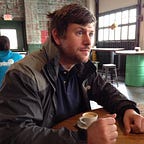Inspiration is for Amateurs
Thoughts on Noticing
In his book, Do/Interesting, Russell Davies writes about the two schools of thought regarding creative output: The magician vs. the amateur. Outside of inspiring more time for writing, it has made me reflect and examine many of the practices and processes I employ within the operations of an agency.
What I found myself ruminating more and more on was the value of asking better questions when it comes to getting to an insight or truth.
For many of us, Stephen King’s “Planning Cycle” the default model for where to start.
Not only does King’s “Planning Cycle,” frame itself as a sequence of questions — but it defines the most critical component to brand planning — Where could we be?
As we move from goals and objectives into marketing tasks and then into defining what our communications must achieve, our ability to ask better questions directly influences what those outputs become. And getting to better questions starts with better frames — our reference materials.
My fear is that those of us who market higher education are working from the same source material. The same research. The same white papers. The same podcasts. And while all are helpful, if we don’t take the time to consider higher education in a greater context we run the risk of us all following the same path. We start leading our clients to the same solution.
How do we reroute this path?
Attention is vitality. — Sontag
It’s here that we finally get to noticing.
My goal for this year is to make noticing — compiling disparate source material — part of my daily practice. Starting with psychology instead of prospective student surveys. Looking to culture rather than the same corner of LinkedIn. Once again, broadening my frames.
Some recent highlights:
David Keirsey’s Four Temperaments as a way to think about consumer motivations.
Jobs-to-be-Done Theory to connect media, audience context and the message.
Lots of fiction. Murakami, Modiano and Ishiguro to find new words and a sense of story.
